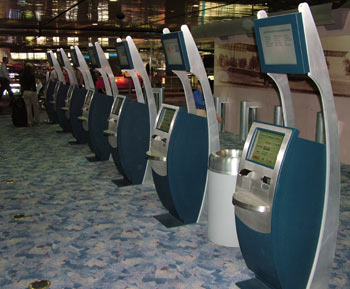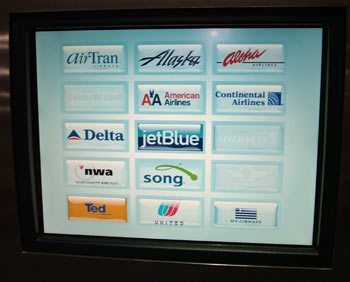Article
The future of airline check-in? disCUSS among yourselves
Travel industry executives will converge in Las Vegas later this month to explore the pros and cons of common-use self-service, which has the potential to drastically change the check-in experience.
May 14, 2006 by James Bickers — Editor, Networld Alliance
Travel itself may be one of life's great pleasures, but many of its trappings and requirements rank with life's great annoyances. Checking baggage, obtaining boarding passes, getting thumped on the head by the duffel bag of the person walking past you in the aisle - none of these is pleasant, but they're all part of the experience.
Self-service reinvented airline check-in a decade ago with the introduction of the check-in kiosk, and many experts believe another behavior-changing innovation is on the way: common-use self-service, or CUSS, a specification developed by the International Air Transport Association that allows airports to put check-in functionality for multiple airlines on a single kiosk.
PPS Publications will host its first "disCUSS" forum May 30 - June 1 at Mandalay Bay Resort & Casino in Las Vegas. Speakers from the travel, hospitality and self-service industries will explore many of the issues surrounding this initiative.
The McCarran Experiment
It is fitting that the forum be held in Las Vegas, for McCarran Airport is one of the innovators in the implementation of CUSS. First launched in October 2003, McCarran's CUSS program - branded "SpeedCheck" - initially consisted of a handful of kiosks. There are more than 100 of the machines throughout the airport today, and six located off-site.
|
McCarran is currently the acknowledged leader in CUSS implementation, but other airports are following suit.
"CUSS could cause a revolution, but the entire industry needs to buy in and adopt the technology," said Daniel Coleman, event director for PPS. "This has not yet happened because with the emergence of Internet check-in and other technologies, many organizations are terrified they will adopt the wrong policies, invest in the wrong technologies, waste money and cause problems."
Several of the airlines whose representatives will be speaking at the event - including British Airways, American Airlines, KLM and Air Canada - have embraced the standard. Coleman said BA was vehemently anti-CUSS two years ago, but have since come around - chiefly, he said, because of the cost-savings CUSS offers airlines.
"CUSS kiosks will enable many more airlines to offer self-service facilities to passengers," said Karly Ingman, spokesperson for NCR subsidiary Kinetics, which has deployed more than 5,800 CUSS-compliant kiosks to date. "Airlines currently using self-service will also be able to offer many more self-service locations."
Ingman pointed out that there are two parts to the CUSS equation - hardware and software. Since the airport owns and operates the CUSS kiosks themselves, all the airline has to do is make its existing software system compliant with the CUSS front-end, and it will be able to simply "plug in" to the airport program. Transactions will continue to take place on the airline's server, with the airport-owned machine handling the printing of boarding passes.
A "maintenance nightmare"
At first blush, it would seem airlines would resist the move toward a common check-in kiosk - after all, self-service devices are not just functional, they're also a key part of a company's brand. Wouldn't airlines always want their own machine, with their own interface and color scheme and marketing messages?

For McCarran, that wasn't the case. Samuel Ingalls, department of aviation assistant director for McCarran, said his airlines felt their check-in kiosks were "a maintenance nightmare," and the brand differentiation they provided wasn't worth the trouble and expense.
With proprietary kiosks, a broken machine means a service call to an outside maintenance company, which means downtime. But since McCarran owns and operates all of the kiosks in its building, it makes economic sense to keep the repair staff nearby - in this case, the airport employs its own maintenance technicians, a team of 13 full-time employees that are already on-site 21 hours a day.
Plus, a standardized hardware platform across the entire kiosk program means machine parts and consumables easily can be kept in stock.
Ingalls said airlines were told at the outset that participation in the CUSS program would be mandatory. Each airline signed a letter of intent stating that they would remove their proprietary kiosks at some point in the future. "In most cases, the carriers were saying, `We'd love you to put yours in,'" he said.

The networked nature of the CUSS kiosks opens up new possibilities for remote management and maintenance.
"My maintenance people can reset a kiosk app from the computer at their desk, or anywhere else using a wireless PDA," Ingalls said. "That's especially important as we move into remote locations."
Beyond the airport
If CUSS were just an innovation for airport operators, it would be necessarily limited - after all, terminal space is of a finite quantity. But a big part of the promise of CUSS is the potential for off-site kiosks.
McCarran, for instance, currently operates six kiosks off-site, four of which are located in the parking garage, two in hotels. It's all part of the dual strategies of CUSS: Let travelers check-in wherever convenient for them, while at the same time dispersing traffic from highly concentrated areas to much larger ones.
In the near future, CUSS kiosks might prove valuable in any location that travelers pass on their way to and from the airport: hotels, restaurants, casinos, parking garages, or cruise ships, to name a few.
"Ultimately, I'd like to see CUSS kiosks in all of the hotels," he said.













